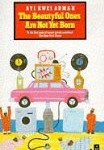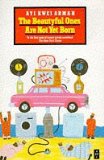Five words from the blurb: Ghana, bribes, corruption, temptation, scorn
This week Kinna Reads is hosting Ghanaian Literature Week. Keen to join in I went online to research books from Ghana. The Beautyful Ones Are Not Yet Born was described as “a cornerstone of African literature” and “as important as Things Fall Apart by Achebe “. I hadn’t heard of it, but with quotes like that I felt I had to read it.
The Beautyful Ones Are Not Yet Born is set in the mid 1960s and confronts the corruption present in the country after its independence. The central character is an unnamed railway clerk who resists bribes. The book explores issues of integrity and shows what life is like for ordinary citizens who have to live with corruption on a daily basis.
Unfortunately this book was so slow and tedious to read that any impact was lost on me.
Crossing over to the side of the main connecting road nearer the sea, the man walked the whole distance to the Essei area, keeping just behind the breakwater that kept the sea from destroying the road. Now and then the headlights of some oncoming vehicle came and blinded him and afterward the darkness of the night was even deeper and more infinite than before, so that a little of the lost comfortable feeling of the man alone in the world outside, so unlike the loneliness of the beloved surrounded by the grieving loved ones, came back to him in little frustrating sweet moments that were gone before they could be grasped. And yet, in some region of his mind, the thought almost rose: that it should not really be possible for the guiltless to feel so beaten down with the accusation of those so near….
The sentence structure was often awkward and difficult to follow and the pace was so slow that it would take him several pages just to get out of his chair. Lots of profound statements were buried in the text, but I had so little connection to the characters that I didn’t care.
Things picked up a bit towards the end and so I managed to complete this short book (180 pages), but it took a lot longer than expected.
I can see why this is an important piece of African literature and I’m sure that much more would be revealed if you were to spend time studying the text, but I’m afraid I found it a frustratingly slow read.

.
Head over to Kinna Reads to discover more Ghanaian Literature.


15 replies on “The Beautyful Ones Are Not Yet Born – Ayi Armah”
Yes, Ayi kwei Armah’s Beautiful Ones Are Not Yet Born could be difficult to understand. I read it in Secondary School in the 1980s, and I understood it probably because it was a set text, prescribed for O level literature students so we had analysis and interpretation of the text.
The novel describes the corruption and filth, literarly and figuratively, that existed in post independent Ghana and the disappointment felt by the people of Ghana with the government. The unamed clerk symbolises the everyday man and his struggles for survivial and answers in a nation that has nothing to offer.
Armah also talks about the cargo mentality where a person is expected to go abroad and come home to be a saviour to his people so much so that one who comes home empty handed is not regarded. This situation is a reflection of the poverty of the people and their unrealistic expectations, but are the expectations really unrealistic, considering that the whiteman’s land is perceived to be flowing with milk and honey?
Armah also uses strong language to portray his disgust with the corrupt system and really by his title, he is very pessimistic and rather cynical in lamenting that the incorruptible ones are yet to be born.
celestine nudanu, I understood the overall message it conveyed, but I’m sure there are several other smaller points that passed me by. I imagine that you’d have gained a lot by studying it for O level – I wish we’d had books like this at school (although I probably wouldn’t have thought so at the time!)
I hadn’t heard of cargo mentality before – that is a new term to me (although the concept isn’t) I don’t think their expecations were unrealistic – in comparison to what they had the white man’s land really was flowing with milk and honey.
Thanks for commenting on my blog for the first time 🙂
[…] The Beautyful Ones Are Not Yet Born by Ayikwei Armah (at Farm Lane Books Blog) […]
I see why those quotes caught your interest; I haven’t heard of this one either. I’m figuring that the excerpt you chose was to reveal the pace of the writing rather than the awkwardness, because I thought the flow of this was quite lovely actually (maybe that’s just me?). It’s simple language, and I can understand the pace not appealing to every reader, but I appreciate the rhythm of it; it’s the sort of prose that makes me want to read aloud.
As an aside, I have always found that the books that are the shortest suggest to me that I will be done reading them more quickly and that is nearly always the opposite of my true experience of them. The skinny ones take me a-g-e-s!
Buried In Print, I chose the extract because I thought it showed the pace of the book really well. It showed how lovely ideas were buried in a mountain of text. If you like the rhythm then I think you stand a good chance of enjoying the book. The awkwardness is probably just down to the fact it is Ghanaian English and so the sentence structure is slightly different to the one I usually use. It just meant I sometimes had to read a section a couple of times to grasp the meaning – not something I wanted to do when the pace was already really slow. 🙁
Beware the skinny book!!!
I haven’t read the book but I wonder if your problem is partially in the translation? English doesn’t normally have sentences that long. German and Dutch do, but not English. Maybe in the original text the sentences are like that, but for the English translation they should have been cut up in shorter sentences. I think. 🙂
Judith, You make a good point. This book hasn’t been translated as it was written in English initially, but Ghanaian English is probably very different in style to the English I’m used to. I did find the long sentences difficult to follow. I wonder if I’d have enjoyed it more if someone translated it into British English? I don’t think so as I think it would lose a bit of the African atmosphere and it wouldn’t solve the pace problem, but I’d be interested to see!
Oh, I see. I didn’t realise it was in English already! So maybe it’s a matter of getting used to this kind of writing.
I had issues with the Armah I read earlier this week because I found it rather preachy, but at the same time liked it, if that makes sense. I find that often with African lit the sentence structure, grammar, language in general has been forced to fit. It is a colonial language and it is often written in a way that makes it more natural rather than forced as it would be, forced onto people whose first language it isn’t. ( Dambudzo Marechera commented on that and I mention it in my review next Thursday, actually, heh)
It’s interesting I found the first couple African lit books I read slow – Flowers and Shadows by Ben Okri, Things Fall Apart by Chinua Achebe – and I wonder if it is partially the time. The older works I still find slower to read while newer works, especially by expat authors, read quicker and seem more suited to the language and grammar that we are used to. Perhaps the slowness in part is getting used to other ways of thinking / reading / writing?
Not sure, just thinking out loud here! 🙂
Amy, It is interesting that you found Armah preachy – I didn’t find this book preachy at all. All the messages were buried in too much text!
The first African lit book I read was probably The Famished Road by Ben Okri and I did find it slow, but I loved that book. The imagery and atmosphere were fantastic and I was gripped. I didn’t find the pace of Things Fall Apart that slow (I loved that book too!) but Beautyful Ones was in another league – so slow 🙁 I’m not sure about it being about getting used to others way of thinking – I’ve found painfully slow books from many different countries 😉
Well but it’s like you said above to Judith. That maybe it would have been easier if translated to ‘British English’. So at present it is written in a way that makes less sense to you in terms of language and grammar even though it is still written in English, right?
Amy, I don’t think it would be the same if it was translated into British English. I think it is just one of those books with a style I don’t enjoy. I’m not a fan of Marilynne Robinson or Virginia Woolf, but I wouldn’t suggest their books were re-written so I can enjoy them. We just have to accept we all like different books and I prefer mine with a plot 🙂
I find Amy’s suggestion that older African fiction and English intersting. They are certainly slower in pace than contemporary fiction. Armah can be conundrum I tell you. He garners strong reactions to his books. Still, The beautiful One is a favorite read of many. I really like another book of his, The Healers, more than this one. I’m glad that you tried him and thank you for participating in Ghana Lit Week 🙂
Thinking about it more, Kinna, I think it has more to do with the author and whether they have lived in Africa their whole life of if they are expat writers and so writing more in a British / US / etc dialect? Hmmm….
Amy/Kinna, I’m sure the audience the book is aimed at makes a difference too. I assume that this book is aimed at a Ghanaian audience, questioning their attitudes to corruption. This book with therefore have less impact on those of us lucky enough to live in a country without corruption.
Whereas books like Things Fall Apart have a more universal appeal. Everyone will be equally appalled by the treatment of a community by outsiders – it is something we can all relate to.